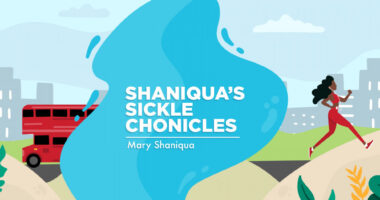‘Disabled’ Is Not a Bad Word

“Disabled” is not a pejorative, but it definitely felt like one when I was growing up.
The U.S. Centers for Disease Control and Prevention defines disability as “any condition of the body or mind (impairment) that makes it more difficult for the person with the condition to do certain activities (activity limitation) and interact with the world around them (participation restrictions).” Sickle cell disease undeniably falls into that category.
Although sickle cell disease is classified as a disability, while growing up, I felt that those around me didn’t like it when I attributed the struggles I faced with my health to having a disability. They didn’t like that I acknowledged the place that sickle cell has in my life. They didn’t like that I accepted my diagnosis.
I know that those close to me didn’t like how comfortable I was with openly sharing details of my health. I think they viewed it as a proactive response because they didn’t want people to discriminate against me because of my health. They also probably didn’t want sickle cell disease to define me.
It didn’t always seem that way, though. I believed then, and still do, that I don’t have to keep my disability a secret. It is my reality, and I have the right to share details about it.
I also believe that those around me didn’t like my use of the term disabled. An unfair prejudice has existed that those who are disabled are lazy. An invisible disability also made people think I was being deceitful. Both of these observations are far from the truth, not only about me, but also about most people with disabilities.
When I sense that people around me are becoming uncomfortable that I am discussing my health, I start to feel embarrassed, which shouldn’t happen. I shouldn’t be made to feel worse off because of my health.
The conversations we have about disabilities are important. Disability affects most people, either directly when someone has a disability, or indirectly when it’s someone you know. As a society, we must be able to embrace the disabled community and talk freely about such things. Taking about a disability shouldn’t be taboo, and one shouldn’t shy away from a conversation because they feel uncomfortable.
To readers, whether you have a disability or not, I challenge you to bring sickle cell disease up in conversations. Start to make it a normal topic of conversation. Let’s promote positive change.
***
Note: Sickle Cell Anemia News is strictly a news and information website about the disease. It does not provide medical advice, diagnosis, or treatment. This content is not intended to be a substitute for professional medical advice, diagnosis, or treatment. Always seek the advice of your physician or other qualified health provider with any questions you may have regarding a medical condition. Never disregard professional medical advice or delay in seeking it because of something you have read on this website. The opinions expressed in this column are not those of Sickle Cell Anemia News or its parent company, Bionews, and are intended to spark discussion about issues pertaining to sickle cell anemia.







Leave a comment
Fill in the required fields to post. Your email address will not be published.